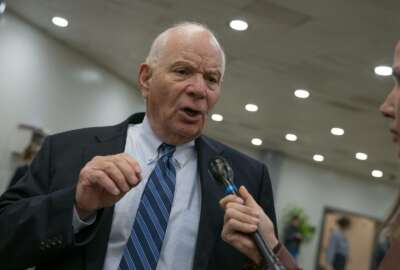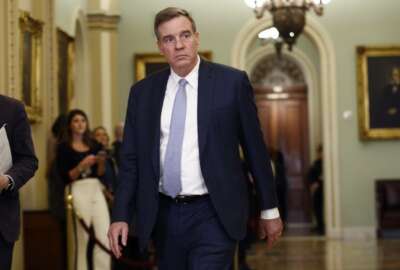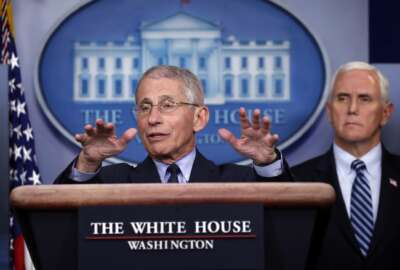
Virginia senator worries for federal employees and contractors
Congress, having gutted out the biggest stimulus bill ever, is busier than ever.
Best listening experience is on Chrome, Firefox or Safari. Subscribe to Federal Drive’s daily audio interviews on Apple Podcasts or PodcastOne.
Congress, having gutted out the biggest stimulus bill ever, is busier than ever. That’s even with members scattering to the 50 states. For Virginia Sen. Mark Warner, much of the concern is nearby, with a lot of federal employees and defense contractors just across the river from Washington, D.C. Sen. Warner joined Federal Drive with Tom Temin for an update.
Interview transcript:
Tom Temin: And how are you faring in Lock down Virginia?
Mark Warner: Well it’s, like all of us in the DMV, challenging times. I actually thought that after the bill that passed last Wednesday night that the pressure might decrease. If anything, it’s increased. I think I’m working as hard, if not harder the last week as we try to get information about the bill out, try to figure out where we made a mistake, and you what may be coming next.
Tom Temin: And you have a particular interest in national security contractors have offered some remedy there. Tell us more about that one.
Mark Warner: Well, I think we got pretty good language in the bill itself for our contractors in the community to make sure that they would be reimbursed on sick leave, folks got affected by the virus, for folks who were quarantined. There was some question in the language. So I sent another letter to the acting OMB director today to see if we could get clarification and a little more guidance from them to make sure that our contractor community is not going to be unfairly hurt by the legislation. We also – what I’m particularly concerned about it is our national security workforce as well. If you work in a SCIF, if you work intel or DoD, there may be a lot of work that you cannot do from home so the ability to telework is undermined. And I don’t want that community to be lost. Having spent as much time as I have on security clearance reform where we’ve tried to clear the process, it still is timely and expensive. I don’t want that cleared workforce to go take other work during this downturn. So we’ve tried to protect that. I’m asking for this guidance from [the] OMB director, and what I also got in the bill that I’m not sure has received much attention, but there is $17 billion of direct appropriation, to the Treasury secretary to shore up national security needs. And while some of that may be going to some of the large enterprises, the Boeing[s] and GE[s], when I lobbied the Treasury secretary on this issue, you know, the very issue I pointed out was our intel and DoD cleared workforce to make sure that we don’t lose them. So I’m gonna be very active, hopefully. And in making sure that that program, which has not been stood up yet, is – takes advantage or protects that part of our community as well. And one other comment just, you know, on something that didn’t take place in some of the other stimulus packages. And we didn’t get this for the whole kind of lower-end contracting community. But we did get at least for some of the folks who served the meals and working the cafeterias at the Capitol that for the first time, they will actually be covered during this period when the Capitol’s closed. I will obviously want to make sure that extends to all the contractor community, we think contractors [as] normally high-end. But I think about the folks who serve the food and clean the bathrooms at the Smithsonian are all contractors and they’ve not been treated, I think, fairly in past efforts like this.
Tom Temin: Sure, and talking about the national security contractors for one more moment. -I guess part of the issue there extends beyond Virginia and Maryland, and where all these contractor headquarters tend to be concentrated. And that is this vast supply chain, which is nationwide.
Mark Warner: Well, it absolutely does, Tom. The supply chain issues, the fact of a lot of our a lot of our national labs which, you know fall into the Department of Energy bucket. But much of the work on those labs is classified. And again, you cannot, if you’re working on Quantum, you may not be able to do that from your home. So, this is a workforce that, you know, some of the language was in the bill, out of the bill. We got pretty good language in there, but because there were some”mays” rather than “shalls,” I want to clarify that. And again, my – reserve here is that $17 billion of direct appropriation that, again, I don’t want it to all go to simply some of the largest players.
Tom Temin: We’re speaking with Virginia Sen. Mark Warner. And I wanted to ask you about the possibility of detailed follow-on bills. Yesterday, Sen. Cardin said there might be a fourth, fifth, sixth and seventh bill. Is that your thinking, also? And what are some of the other elements that might be in those?
Mark Warner: Well, there will at least be fourth bill. I mean, I think we’re gonna have economic consequences of this virus for, you know, many quarters to come. Hopefully quarters, not years, but that’s still an unknowable item. And I was on, for example, calls today with my local government officials and, you know, their loss of revenues. There’s, as people try to differ on real estate taxes and other local-based taxes it’s going to really hit local government across Virginia, for that matter, across the country. And we need some support there. One of the most egregious things that happen in this last bill, the CARES bill, was how D.C. was treated. The fact that D.C, which is normally for federal funding purposes treated like a state ,and was specifically excluded. So D.C. got less than half the money, about $500 million when every state, smaller state around got $1.2 billion. And there are a number of states that are smaller than D.C. And obviously with the more dense concentration, at least initially, there’s probably going to be higher COVID-19 challenges in D.C. than in some of these more rural states. That’s, I know that all of the regional delegation has felt very strongly on that item. But I think again, there’s gonna be a host of issues we’ll have to deal with. One of the most remarkable things about this legislation, it’s being advertised in the popular press at $2.2 trillion. In reality it’s $6.2 trillion because $425 billion of those dollars are leveraged 10-to-1 in a Federal Reserve bank facility called 13(3) that those funds will be able to purchase, shore up major industries and buy commercial paper, commercial debt. But it will also be able to buy state and local government debt. And even at that size, that enormous, enormous size, that really, for the most part, will take care of the economy and some of the most hard hit from three to four to five months. And as we pointed out, not all of the economy for three to four to five months. So, whether Ben’s right that we’re gonna go up to five, six and seven I don’t know, but I can, I will absolutely know there’s going to be at least a four and probably a five.
Tom Temin: And a small issue that has come up in recent days that affects quite a number of federal employees, and that is the issue of hazardous pay for BOP workers – prison workers – agriculture workers and so on, that come in close contact with people or things that have coronavirus. And they have had to sue the government to get some hazardous pay differential. Is that something that there is money for in the last bill or in a future, bill or, is Congress even looked at that issue?
Mark Warner: I don’t believe there’s money in the current bill. But this issue of hazardous duty pay, you know, during a pandemic is something I’m sympathetic to. But I also, we need to think it through because, well, I don’t deny those federal workers who have been, have the possibility of being exposed, I do think we need to recognize, you know that, maybe some of the most hazardous duty workers around now, you know, beyond those immediately exposed in our health care system – maybe the person at the grocery store checkout? So there are a wide, wide range of workers now that are essential to keep our economy going, that maybe didn’t think when they signed up to be a grocery store clerk or a – you know, work at the pharmacy or for that matter, even to a degree, working the sanitation department that they were gonna be front line emergency responders. But I think they fall under those hazardous characteristics, as well.
Tom Temin: And finally, what is your assessment of what’s going to happen with 2021 appropriations discussions, debates, fights?
Mark Warner: Well, we’re still, you know, submitting our our letters. We were operating until the Senate shut down a little bit later, I think, than some of the other Senate offices. So we were still moving forward as if they were going to be the normal timeline. I understand some of the hearings have obviously been pushed back. I think there’s a bit of an open question mark, but I know, my understanding at least is that Sen. [Richard] Shelby and Sen. [Patrick] Leahy were trying to you know, continue as planned, subject to the great unknown of how long we’ll be out. And there are, I know there have been some questions about whether some of these hearings can be done electronically by Zoom or, I think about the number of meetings and conference calls and sessions I’ve had, particularly on Zoom and Skype. Was a little strange at first, but I’m getting a little more comfortable with it. And I’m actually probably more stacked up the last few days than I would be on a normal day on the Hill.
Tom Temin: Virginia Sen. Mark Warner. Thanks so much.
Mark Warner: Tom, thank you. Be well and stay safe.
Tom Temin: You too. We’ll post this interview at www,federalnewsnetwork.com/FederalDrive. Subscribe to the Federal Drive at Apple Podcasts or Podcastone.
Copyright © 2024 Federal News Network. All rights reserved. This website is not intended for users located within the European Economic Area.




